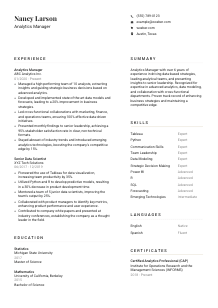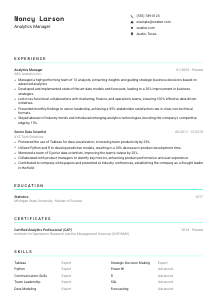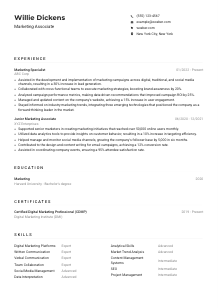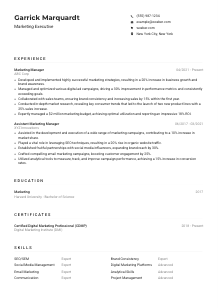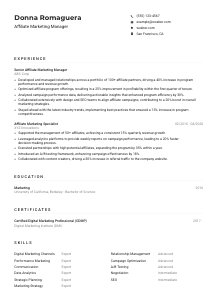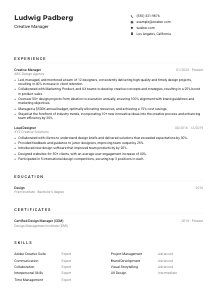Analytics Manager Resume Example
Delving into data, but your resume lacks insights? Peruse this Analytics Manager resume example, curated with Wozber free resume builder. Grasp how you can intricately blend your analytical acumen with job prerequisites, shaping a career narrative that's as compelling as the insights you uncover!
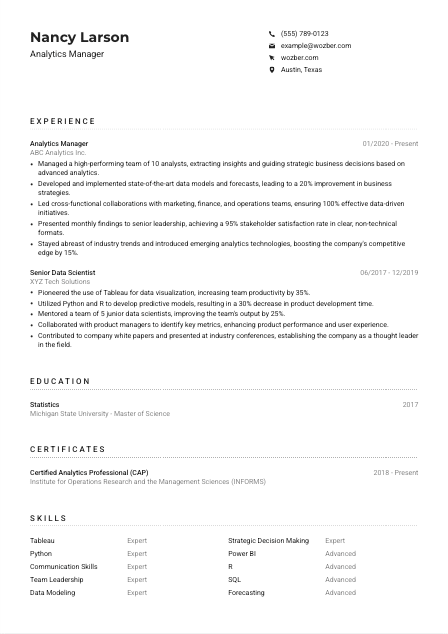
How to write an Analytics Manager Resume?
Hello, aspiring Analytics Manager! In the data-driven realm where insights create impact, your resume isn't just paper – it's your golden ticket, your narrative that breathes life into your professional journey. With Wozber's free resume builder at your fingertips, this tailored guide will steer you through the art of crafting a resume that not only meets the exacting standards of your dream role but also passes the meticulous scrutiny of an ATS. Get ready to mold your resume into an irresistible narrative that doesn't just resonate with hiring managers but ensures you stand out in the world of analytics.
Personal Details
Your introduction is more than just the beginning of your resume; it's your headline act. Let's delve into customizing this section to make a splash in the analytics field.
1. Name as Your Brand
Start strong with your name. Make it memorable but keep it professional. Think of it as the title of your professional story, presented in a font that's both striking and elegant.
2. Job Title Alignment
"Analytics Manager" - seeing this right below your name ties your identity to your ambition. It signals to the hiring manager right from the get-go that you're not just applying to any role; you're aiming for this one.
3. Direct Line of Contact
Include a phone number that's always with you and an email that's professional. Typos in contact information are more common than you'd think, so triple-check this section.
4. Local Advantage
Being a local candidate often has its advantages. Highlighting 'Austin, Texas' communicates you're in sync with one of the job's logistical needs, reducing potential hiring barriers.
5. Web Presence
Including a LinkedIn profile or a personal website dedicated to your professional achievements can add depth to your resume, offering a fuller picture of your capabilities and ambitions.
Takeaway
Think of the Personal Details section as the cover of your professional book. It's succinct, directly connecting you to the role, and polished to spotlight your professionalism. This is where the narrative of 'you' begins.





Experience
The Experience section is where your past paves the way for your future. Let's ensure your journey reflects a path that leads directly to the role of an Analytics Manager.
- Managed a high‑performing team of 10 analysts, extracting insights and guiding strategic business decisions based on advanced analytics.
- Developed and implemented state‑of‑the‑art data models and forecasts, leading to a 20% improvement in business strategies.
- Led cross‑functional collaborations with marketing, finance, and operations teams, ensuring 100% effective data‑driven initiatives.
- Presented monthly findings to senior leadership, achieving a 95% stakeholder satisfaction rate in clear, non‑technical formats.
- Stayed abreast of industry trends and introduced emerging analytics technologies, boosting the company's competitive edge by 15%.
- Pioneered the use of Tableau for data visualization, increasing team productivity by 35%.
- Utilized Python and R to develop predictive models, resulting in a 30% decrease in product development time.
- Mentored a team of 5 junior data scientists, improving the team's output by 25%.
- Collaborated with product managers to identify key metrics, enhancing product performance and user experience.
- Contributed to company white papers and presented at industry conferences, establishing the company as a thought leader in the field.
1. Dissect the Job Description
Dive deep into the job requirements. Here, 'Managing a team of analysts' and 'developing data models' aren't just tasks; they're your proving grounds. These are the experiences you need to highlight.
2. Your Professional Saga
Structure your career chronology clearly, focusing on roles that contribute directly to your goal. Positions where you led projects or teams, especially in analytics, should take center stage.
3. Achievements That Speak Volumes
"Developed and implemented data models leading to a 20% improvement in business strategies" – this isn't just a bullet point; it's a headline. Quantify your achievements to make your impact undeniable.
4. The Power of Numbers
Numbers tell a compelling story. Whether it's performance improvements, team size, or project budgets, quantitative details provide a tangible measure of your contributions and capabilities.
5. Relevance is Key
Your dabble in other fields might be interesting, but here, the spotlight is on analytics. Tailor your listed experiences to fit the mold of an Analytics Manager – every line should echo your suitability for the role.
Takeaway
Crafting an impressive Experience section means telling the story of a professional journey tailor-made for the Analytics Manager role. Highlight leadership, technical prowess, and a sterling track record to make it clear: You're not just a candidate; you're the candidate.
Education
In the analytics domain, your educational background is a testament to your analytical and quantitative prowess. Let's sculpt this section to align with the role's demands.
1. Target Degree Specifications
A "Bachelor's degree in a quantitative field" isn't just a requirement; it's your ticket in. Whether it's your major in Mathematics or your PhD in Statistics, make sure it's front and center.
2. Structure for Clarity
Present your academic credentials in a clean and orderly fashion. The names of degrees, institutions, and graduation years should be easy to find and understand at a glance.
3. Degree Relevance
In a field as specific as analytics, the relevance of your degree can't be understated. Matching your degrees – "Master of Science in Statistics" and "Bachelor of Science in Mathematics" – with job requirements demonstrates your foundational expertise.
4. Coursework and Projects
Though not necessary for every resume, highlighting pertinent courses or projects can be particularly effective early in your career, showcasing your dedication and skill depth.
5. Showcase Achievements
Your academic journey may include notable achievements beyond your GPA. Leadership roles, relevant organizations, or significant projects aligning with analytics underscore your commitment and capability.
Takeaway
Your education section is more than a list of degrees; it's proof of your preparedness for the Analytics Manager role. Make it resonate with precision, showing your academic journey has perfectly prepared you for the challenges and responsibilities of the position.
Certificates
In a field that evolves as relentlessly as analytics, certifications are your evidence of continued learning and expertise. Tailor this section to highlight your unwavering commitment to staying ahead.
1. Certifications and Job Alignment
While the role description might not list specific certifications, choosing to include ones like "Certified Analytics Professional" speaks directly to your dedication and proficiency in the field.
2. Selective Highlighting
Prioritize certificates that bolster your candidacy for the Analytics Manager role. Each listed certification should reinforce your expertise and readiness for the responsibilities the position entails.
3. Dates Matter
Including the dates of certification, especially for credentials that are regularly updated, demonstrates your ongoing commitment to professional development.
4. Continuous Learning
The landscape of analytics is ever-changing. Show that you're not just keeping pace but are proactive in embracing new knowledge and methodologies. Your commitment to growth is a testament to your passion for the field.
Takeaway
In the analytics arena, certifications are not just accolades; they are affirmations of your skill, knowledge, and dedication. Highlighting these achievements tells a compelling story of a professional who is not only qualified but passionately engaged with the evolving demands of the field.
Skills
The Skills section of your resume is your professional arsenal. Here, we decode how to arm yourself with the right skills for the Analytics Manager role, balancing technical expertise with leadership acumen.
1. Skills Synthesis
Start with a deep dive into both the explicit and inferred skills from the job description. From "data visualization tools like Tableau" to "exceptional interpersonal and communication skills", every skill you list should resonate with the job's demands.
2. Prioritizing Pertinence
Focus on skills that align directly with the job description. The significance of programming in Python or R can't be overstated, nor can leadership qualities in an analytics setting. Showing expertise in these areas is non-negotiable.
3. Conciseness and Clarity
While the temptation to list every skill you possess might be strong, restraint is key. Keep the list concise, focusing solely on skills that sharpen your profile for the Analytics Manager role. This isn't just a list; it's a strategic selection.
Takeaway
Curating your Skills section is like choosing the perfect tools for a mission-critical project. The skills you highlight are promises of the value you bring, painting you as the perfect blend of analyst, tech expert, and leader. Approach this section as a showcase, demonstrating you're not only a fit but a force to be reckoned with.
Languages
The global nature of today's marketplace means language skills can significantly broaden your professional appeal. Tailor this section to demonstrate not just your ability to communicate, but to connect across cultures.
1. Language Priorities
English fluency is specified as a prerequisite for the role, placing it at the top of your languages list. This isn't just meeting a requirement; it's your first step in ensuring clear communication.
2. Language Proficiencies
Listing other languages you're proficient in, even if not mentioned in the job description, adds color to your candidacy, showcasing versatility and readiness for multinational collaborations.
3. Honesty in Proficiency
Clearly indicate your level of proficiency for each language. From "Native" to "Basic", the clarity here speaks to your integrity and understanding of your abilities.
4. Global Mindset
For Analytics Managers, the ability to analyze data isn't limited by geography. Fluency in additional languages might hint at your ability to manage diverse teams or interpret data from various markets.
5. Role Relevance
In a role where insights and findings often cross global desks, every additional language you master not only enhances your communication but potentially widens the scope of your impact.
Takeaway
Your ability to navigate different languages is a vivid illustration of your ability to engage in a world that's increasingly interconnected. It's not just about speaking; it's about understanding, connecting, and possibly leading in diverse settings. Your linguistic capabilities accentuate your resume, making you not just a candidate, but a global ambassador of analytics.
Summary
The Summary section is your chance to succinctly present who you are and what you bring to the table. Tailor it to leave no doubt that you are the ideal candidate for the Analytics Manager role.
1. Essence of the Job
Begin by internalizing the core of the Analytics Manager role. This isn't about listing qualifications; it's about enveloping your essence in the responsibilities and aspirations of the position.
2. Introduce Yourself
Start with a powerful introduction that encapsulates your professional identity. "Analytics Manager with over 6 years of experience in driving data-based strategies" isn't just factual; it's compelling.
3. Address the Core
Highlight your expertise and accomplishments, like your command over data visualization tools and programming languages. But don't stop there; weave in your leadership and collaborative prowess to form a complete picture.
4. Conciseness is Key
Your summary is the appetizer, not the main course. Craft it to entice and intrigue, providing a concise yet potent glimpse into your professional narrative. Keep it engaging, precise, and impactful.
Takeaway
Your resume summary isn't just a brief; it's your billboard – a snapshot that captivates and conveys your suitability and readiness for the Analytics Manager role at just a glance. It sets the stage, promising a deep dive into the journey of a dedicated and accomplished analytics professional. Let it shine, let it speak, and let it herald your upcoming achievements!
Launching Your Analytics Manager Journey
As we wrap up this tailored journey through crafting your Analytics Manager resume, remember that each section, every word, is a brushstroke in the masterpiece that is your professional narrative. With Wozber's free resume builder, ATS-friendly resume templates, and ATS resume scanner, you're equipped not just to contend, but to stand out. Your story is compelling, your skills are in demand, and your goals are within reach. Sharpen your narrative, polish your presentation, and launch into the analytics realm with confidence.
The data might predict probabilities, but your resume? It promises success. Let's dive in and make those analytics work for you.

- Bachelor's degree in a quantitative field such as Mathematics, Statistics, Economics, or related disciplines.
- Minimum of 5 years of experience in advanced analytics, data science, or related fields.
- Proficiency in data visualization tools such as Tableau or Power BI.
- Strong programming skills in languages such as Python or R, with familiarity in SQL.
- Ability to lead and mentor a team, with exceptional interpersonal and communication skills.
- English fluency is a prerequisite.
- Must be located in Austin, Texas.
- Manage a team of analysts to extract insights and drive business decisions based on data.
- Develop and implement data models, forecasts, and statistical analyses to support business strategies.
- Collaborate with cross-functional teams to ensure effective data-driven initiatives.
- Present findings and recommendations to senior leadership in a clear, non-technical manner.
- Continuously stay updated with emerging analytics technologies and methodologies to maintain a competitive edge.





